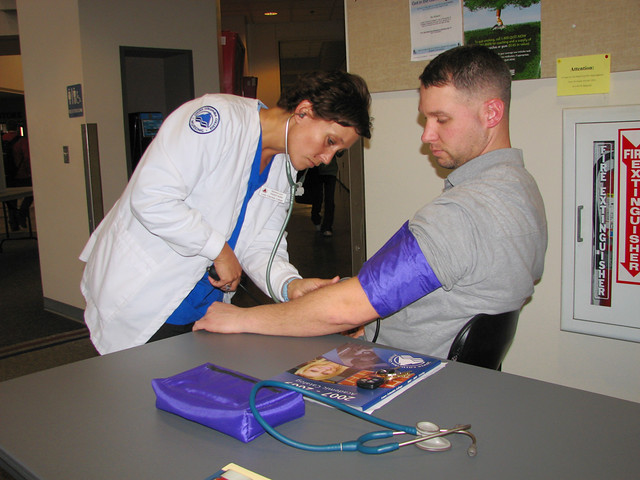Nursing is an incredibly rewarding and fulfilling career to take upon oneself. There is also a great deal of job security in the field as the need for nurses is something that continues to trend upwards. As a greater portion of the population of the United States ages, there is a growing need for qualified healthcare professionals to step in. There is also a great deal of job growth and career progression in the field of nursing that you might not have known about.
While a great many nurses continue to work in traditional hospital settings as registered nurses (RN), it has become increasingly more evident that nurses can contribute to the greater scope of healthcare as well. The experience that they receive working in direct patient care as well as the education they earn makes them excellent candidates for roles of greater responsibility.
This fact rings particularly true for nurses who opt to go the route of higher education and earn advanced degrees in specific areas of medicine. There are a number of fantastic options for nurses looking to take their career further and take on higher roles in healthcare. Here are just four of the more popular nursing specializations for you to consider:
1. Neonatal Nursing
The area of medicine that focuses on the healthcare of babies, from the time that they are infants to the time that they are two years of age, is referred to as neonatal care. Nurses who wish to work in neonatal care can have an incredibly fulfilling career assisting babies and parents as they navigate through the many and varied health-related issues that can arise within the first two years of life outside the womb. It is naturally an emotional job at times, but nurses with the right qualifications and degree of empathy are, and always will be, needed in this field.
In order to become a neonatal nurse, you would need to start off by earning your Bachelor of Science in Nursing (BSN) degree and become a fully qualified RN. After obtaining a few years of experience in the field, you can then apply to graduate school. Neonatal nurses must earn a Doctor of Nursing Practice (DNP) degree with a concentration in neonatal nursing.
Although the prospect of earning a doctoral degree can be an intimidating one, it is the only way to become a fully qualified neonatal nurse. Furthermore, there are some highly accredited online neonatal nurse practitioner programs out there to choose from that are designed to make it possible for you to earn your degree without having to give up your current employment position.
2. Nurse Practitioner
The growing need for qualified healthcare professionals across the country is not limited to the field of nursing. There is also a startling lack of physicians in certain areas as well. With so many people looking to receive the healthcare that they need, there have been some necessary changes to the structure of healthcare in efforts to administer care to underserved areas. One such measure that has been taken involves nurse practitioners (NP).
NPs are highly qualified nurses who hold a DNP degree along with years of experience. Since there aren’t nearly enough physicians to administer care in the family practice setting, some states have permitted NPs to assume family practitioner roles. In some instance, an NP might even be able to set up their own practice and see patients just as a physician would. While there are some limitations on the types of medications that NPs can prescribe to patients, overall an NP can administer healthcare to their own patients without being under the supervision of a physician.
Naturally, this has made the specialization of NP one that is highly popular among nurses. The job security coupled with an enticing salary makes this career path more than desirable. It is important to take note of the precise restrictions that your state has in place for NPs though so that you know what sort of practice you are going to be able to have for yourself.
3. Nurse Anesthetist
One area of nursing that has become widely known as the specialization that grants the highest earning potential in all of nursing, is that of the nurse anesthetist (CRNA). This is a type of advanced-practice nurse that deals in the administering of anesthesia to patients. With a national median salary of around $165,000, this is certainly a position that gets many people’s attention.
Along with actually administering this complicated medication, the CRNA is responsible for running all necessary pre-op tests to ensure the health and safety of the patient. They are also tasked with monitoring their patient in the post-op setting to ensure that there are no adverse reactions to the anesthesia that they have been given.
Becoming a CRNA is a difficult process that requires earning a DNP with a concentration in anesthesia. Moreover, it should be noted that not all CRNAs pull in such high salaries. There are some states that pay significantly above the average, though, so if you are in such a state and feel that becoming a CRNA is for you, it is certainly a worthwhile route to consider.
4. Nurse Midwife
In the United States, there is a growing trend among expectant mothers to seek to have their healthcare needs met throughout pregnancy from a nurse midwife as opposed to a physician. Some experts attribute this fact to the idea that nurse midwives take a more holistic approach to labor and delivery. Many mothers, too, seek to have both a nurse midwife and an OB-GYN working together throughout pregnancy, labor, and delivery.
Nurse midwives are responsible for all prenatal, labor and delivery, and postnatal care. This includes administering routine evaluations on both mother and baby to ensure that all is progressing as it should following birth. With significant job growth expected in the coming years, specializing as a nurse midwife can be an excellent career path option.


















